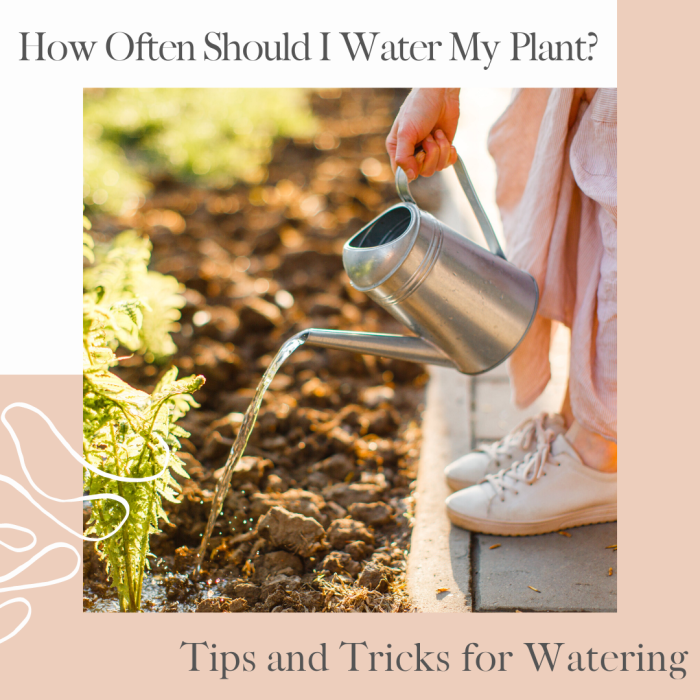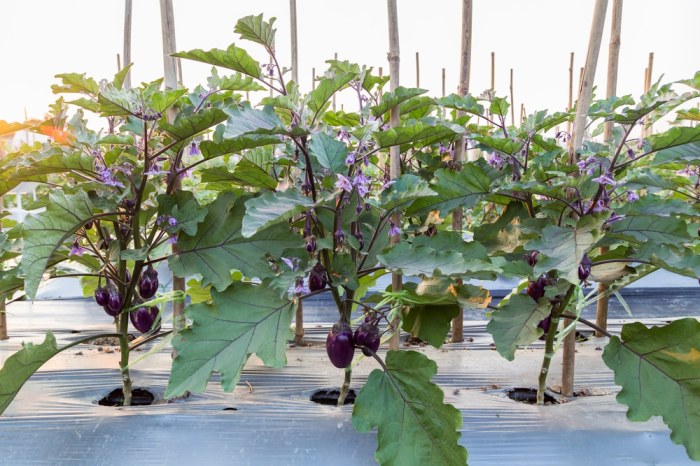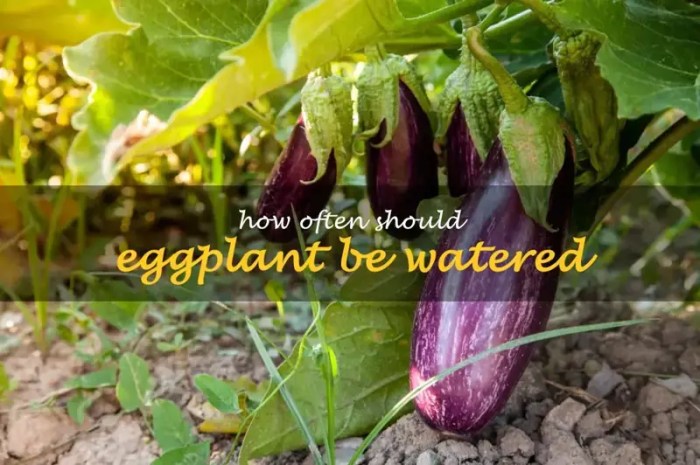How Often Do You Water Eggplant Plants?
Eggplant Watering: A Comprehensive Guide: How Often Do You Water Eggplant Plants

Source: squarespace-cdn.com
How often do you water eggplant plants – Providing your eggplant plants with the right amount of water is crucial for healthy growth and a bountiful harvest. Overwatering or underwatering can lead to various problems, impacting yield and overall plant health. This guide provides a detailed explanation of factors influencing watering frequency, signs of improper watering, effective watering techniques, and strategies for maintaining optimal soil moisture.
Factors Affecting Eggplant Watering Frequency, How often do you water eggplant plants

Source: garden.eco
Several factors influence how often you need to water your eggplant plants. Understanding these factors allows for precise watering, maximizing plant health and fruit production.
Soil Type and Water Retention
Different soil types retain water differently. Sandy soils drain quickly, requiring more frequent watering. Clay soils, conversely, retain water longer and need less frequent watering. Loamy soils, a mixture of sand, silt, and clay, offer a good balance of drainage and water retention. For example, sandy soil might need watering daily during hot, dry weather, while clay soil might only need watering every few days under the same conditions.
Climate and Weather Conditions
Temperature, humidity, and sunlight significantly impact eggplant water requirements. Hot, sunny, and dry conditions increase evaporation, necessitating more frequent watering. Conversely, cooler, cloudy, and humid weather reduces evaporation, allowing for less frequent watering.
| Weather Condition | Soil Moisture Level | Watering Frequency | Notes |
|---|---|---|---|
| Hot, sunny, dry | Dry to the touch | Daily or every other day | Monitor soil closely; consider mulching |
| Warm, partly sunny | Moist but not soggy | Every 2-3 days | Adjust based on soil type and plant size |
| Cool, cloudy, humid | Moist | Every 3-4 days or less | Reduce watering frequency; avoid overwatering |
| Rainy | Moist or wet | No watering needed | Avoid watering if soil is already saturated |
Eggplant Plant Age and Growth Stage
- Seedling: Seedlings require consistent moisture but avoid overwatering to prevent damping-off. Water frequently, keeping the soil evenly moist but not waterlogged.
- Young Plant: As the plant grows, its water needs increase. Water regularly, ensuring the soil remains consistently moist but not soggy.
- Mature Plant: Mature plants require more water, especially during fruiting. Deep watering is crucial to encourage extensive root growth.
- Fruiting Plant: During fruiting, consistent moisture is essential for optimal fruit development. Water deeply and regularly, monitoring soil moisture carefully.
Container Size and Type
Eggplants grown in containers require more frequent watering than those planted in the ground. Smaller containers dry out faster than larger ones. Terracotta pots are porous and dry out more quickly than plastic pots. For example, a small terracotta pot might need daily watering, while a large plastic pot might only need watering every other day.
Signs of Underwatering and Overwatering

Source: shuncy.com
Recognizing the signs of both underwatering and overwatering is crucial for maintaining healthy eggplant plants. Early detection allows for timely corrective action.
Symptoms of Underwatered Eggplants
Underwatered eggplants exhibit wilting leaves, often drooping and curling. Leaf edges might become dry and brown, and the overall plant may appear stressed and stunted. The soil will be dry to the touch.
Symptoms of Overwatered Eggplants
Overwatering leads to yellowing leaves, often starting from the lower leaves. The leaves may become limp and eventually drop. Root rot can develop, leading to a foul odor from the soil and ultimately plant death. The soil will be soggy and may show signs of mold.
| Underwatering Symptoms | Overwatering Symptoms |
|---|---|
| Wilting leaves, drooping | Yellowing leaves, limp leaves |
| Dry, brown leaf edges | Soggy soil, foul odor |
| Stunted growth | Root rot |
| Dry soil | Waterlogged soil |
Diagnosing Watering Problems
- Check the soil moisture: Dig your finger about 2 inches into the soil. If it feels dry, the plant needs watering. If it’s wet, watering is not needed.
- Observe the plant’s appearance: Look for signs of wilting, yellowing, or drooping leaves, as described above.
- Assess the overall plant health: Consider growth rate, fruit production, and overall vigor. Any significant decline could indicate watering issues.
Watering Techniques and Methods
Various methods exist for watering eggplant plants, each with its own advantages and disadvantages. Selecting the right method depends on your resources and the specific needs of your plants.
Watering Method Comparison
| Method | Advantages | Disadvantages | Best Use Cases |
|---|---|---|---|
| Drip Irrigation | Efficient water use, targeted watering, reduces weed growth | Initial setup cost, potential clogging | Large gardens, established plants |
| Soaker Hoses | Easy to use, even watering, reduces evaporation | Can be less effective on slopes, may not reach all plants | Rows of plants, raised beds |
| Hand Watering | Flexible, allows for close monitoring of soil moisture | Labor-intensive, can lead to uneven watering if not careful | Small gardens, container plants |
Tips for Even Watering
- Water deeply and less frequently to encourage deep root growth.
- Avoid overhead watering, which can lead to fungal diseases.
- Water at the base of the plant to avoid wetting the foliage.
- Use mulch to help retain soil moisture and reduce evaporation.
Deep Watering vs. Shallow Watering
Deep, infrequent watering encourages strong root systems, enabling plants to access water more effectively during dry periods. Shallow, frequent watering leads to shallow root systems, making plants more susceptible to drought stress.
Maintaining Soil Moisture and Drainage
Proper soil drainage is crucial for healthy eggplant growth. Poor drainage can lead to root rot and other problems. Maintaining optimal soil moisture levels requires attention to drainage and moisture retention.
Importance of Soil Drainage
Good soil drainage prevents waterlogging, which suffocates roots and creates a breeding ground for diseases. Poor drainage results in waterlogged soil, leading to root rot and stunted plant growth.
Improving Soil Drainage
- Amend heavy clay soils with organic matter like compost to improve drainage and aeration.
- Create raised beds to improve drainage in areas with poor drainage.
- Use well-draining potting mixes for container plants.
Checking Soil Moisture
- Finger Test: Insert your finger about 2 inches into the soil. If it feels dry, water is needed. If it feels moist, wait before watering.
- Moisture Meter: A soil moisture meter provides a more precise measurement of soil moisture levels. Insert the probe into the soil and read the meter’s indication.
Dry soil feels crumbly and powdery. Moist soil is damp but not soggy. Waterlogged soil is saturated and often has a muddy consistency.
Using Mulch
Mulching helps retain soil moisture, suppresses weeds, and regulates soil temperature. Organic mulches like straw or shredded leaves are beneficial for eggplant plants.
FAQ Resource
What type of water is best for eggplant plants?
Use lukewarm water, avoiding very cold or hot water. Ideally, use rainwater if available, as it’s naturally soft and lacks chlorine and other chemicals often found in tap water.
How do I know if my eggplant’s soil needs more organic matter?
Poor drainage, compacted soil, or difficulty retaining moisture are signs that your soil needs more organic matter. Adding compost or other organic materials will improve soil structure and water retention.
Can I overwater my eggplant even with well-draining soil?
Yes, even well-draining soil can become waterlogged if you water too frequently. Always check soil moisture before watering, especially during cooler or wetter periods.
Eggplant plants, similar to many other vegetables, require consistent moisture. The frequency depends on factors like soil type and weather, but generally, aiming for moist but not soggy soil is key. Watering needs are comparable to peppers; to learn more about pepper plant watering, check out this helpful guide on how often do you water a pepper plant.
Understanding pepper plant hydration helps inform eggplant care, as both benefit from a well-drained, evenly moist environment.
My eggplant leaves are drooping, but the soil feels moist. What’s wrong?
This could indicate root rot, often caused by overwatering or poorly draining soil. Check the roots; if they are mushy or brown, the plant may be beyond saving. Improve soil drainage and water less frequently in the future.




















